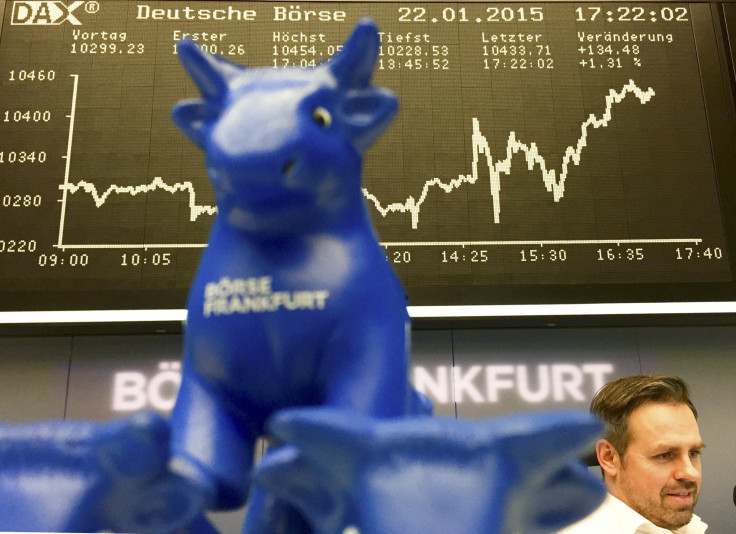Dow Jones Industrial Average Rises On European Central Bank Move; Euro Slides Against The Dollar

The Dow Jones Industrial Average gained Thursday morning after the European Central Bank announced a stimulus program to increase the money supply by 60 billion euros a month, a move aimed at stoking inflation and spurring economic growth in 19-member euro zone. The most immediate effect has been on the value of the euro, which dropped from $1.16 to $1.14 after the ECB announcement.
"This move has mostly been priced in to the markets for some time,” said Joshua Van Dress, chief investment officer at Able Capital Management, based in New York City. The announcement of the stimulus package was expected; the only question was how much the central bank would spend every month. “The ECB announcement this morning will be priced in to the markets by the end of the day.”
The Dow, which measures the share prices of 30 large industrial companies, was trading up 121.93 points, or 0.69 percent, at 17,676.21. The S&P 500 stock index gained 14.93 points, or 0.73 percent, to finish at 2,047.01. The Nasdaq Composite climbed 41.37 points, or 0.89 percent, to 4,709.22.
European shares rallied on the ECB announcement, which helped U.S. markets follow. France’s CAC 40 was up 1.55 percent to 4,554.28, while the German DAX gained 1.23 percent to 10,426.36. London’s FTSE was up by 0.95 percent to 6,791.75 in afternoon trading. The drop in the euro is a welcome reaction to the ECB move, because a weaker euro lowers the cost of investment in the region. It also lowers the cost of European exports, spurring economic growth. The currency dropped below its lowest level since November 2003. It’s down from a high of $1.39 in May 2013, when ECB chief Mario Draghi began talking about a bond-buying program that trades public debt for more currency in the market by purchasing financial assets from banks and other institutions.
The U.S. 10-year bond yield increased slightly, by 1.7 basis points to 1.87 percent. Yields increase when demands for the bonds declines, which happens when investors are more confident in the markets. A sharp drop in the yield would have indicated significant concern over the ECB decision.
But gold, another bid to safety, gained more than $7 to $1,300 an ounce Thursday morning after dipping to $1,294 earlier in the morning, suggesting some apprehension over global economy that wasn’t mitigated by the ECB move.
Oil prices, already down sharply, dropped further after the move in Brussels. Brent, the global benchmark price, lost 29 cents to $48.74 in London. U.S. West Texas Intermediate shed 63 cents to $47.15. The low price of oil has been a major factor in Europe’s low inflation rate, because it’s dropping the cost of fuel expenses for making and moving goods.
Draghi said low oil prices helped push euro zone inflation down for the first time in five years in December and that inflation will remain at or below zero for months to come, closing the year at 0.7 percent. The euro zone target inflation rate is 2 percent, and Draghi said it would only come to 1.3 percent in 2016. Until the rate hits the target, the ECB considers the region under threat of a deflationary cycle that would threaten its feeble recovery from the last global economic downturn.
© Copyright IBTimes 2024. All rights reserved.






















